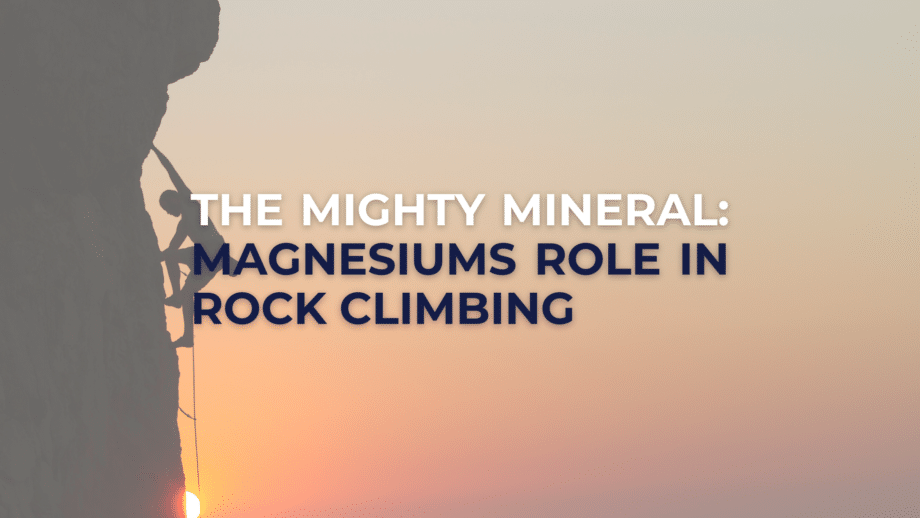Rock climbers, are you looking for something that may elevate your game and give your climbing performance a potential boost? Look no further than magnesium, the mineral superhero you didn’t know you needed. Whether you’re bouldering, free soloing, or tackling some challenging sport routes, magnesium has some impressive benefits that may help you climb higher, harder, and more efficiently. Let’s explore why this mineral is a great addition to your climbing toolkit.
Rock climbing is not just about strength or technique; it’s also about endurance, recovery, and mental focus. Magnesium plays a pivotal role in all these aspects. Here’s how:
- Muscle Function and Performance: Magnesium can be helpful for muscle contractions and relaxation. It may help prevent cramps and muscle fatigue, which means potentially climbing longer without feeling the burn out as fast.
- May aid in the proper transmission of nerve impulses, which can potentially enhance coordination and grip strength.
- May support the conversion of glucose into energy, which can provide that extra boost you need during a climb.
- Bone Health and Structure: Strong bones are the foundation of a good climber. Magnesium works in tandem with calcium which may strengthen bones. Strong bones may encourage less fractures or bone-related injuries.
- May Enhance the absorption of calcium, ensuring your bones get the maximum benefit.
- May play a role in the development of new bone cells, keeping your skeletal system robust.
- Stress and Recovery: Rock climbing can be as taxing mentally as it is physically. Magnesium may help reduce stress which can promote better sleep, crucial for recovery.
- May regulate neurotransmitters that are responsible for calming the brain and promoting relaxation.
- May reduce cortisol levels, the stress hormone, aiding in quicker recovery after a challenging climb.
Magnesium Supplementation for Rock Climbing
When it comes to supplementation, not all magnesium is created equal. There are several forms available, each with its own benefits and uses. Here are some common types that climbers might consider:
- Magnesium Chloride: Known for its bioavailability, the chloride present in magnesium chloride produces hydrochloric acid within the gut which helps enhance the way it is absorbed. It is a great choice for those looking to improve energy levels and muscle function, which can potentially aid in increasing overall climbing endurance.
- Magnesium Glycinate: Known for its calming effects, this form is ideal for climbers who want to enhance recovery and improve sleep quality. It’s also gentle on the stomach, making it a preferred option for those with digestive sensitivities.
- Magnesium Malate: Often used to regulate magnesium levels. Malic acid is an essential compound in enzymes which play a vital role in energy production.
When choosing a supplement, consider your specific needs and consult with a healthcare professional to find the best option for your climbing regimen.
Dietary Sources of Magnesium
Incorporating magnesium-rich foods into your diet is a delicious and natural way to boost your intake. Here are some magnesium-packed foods that can easily fit into a climber’s diet:
- Nuts and Seeds: Almonds, cashews, and pumpkin seeds are not only high in magnesium but also portable, making them perfect snacks for your climbing pack.
- Leafy Greens: Spinach, Swiss chard, and kale are loaded with magnesium. They make excellent additions to meals, whether in salads, sandwiches, or smoothies.
- Whole Grains: Quinoa, brown rice, and whole wheat offer a good dose of magnesium, plus they provide sustained energy, which is vital for long climbing sessions.
- Legumes: Beans and lentils are not only magnesium-rich but also provide protein and fiber, supporting overall health and muscle function.
- Dark Chocolate: A sweet treat that’s also beneficial, dark chocolate contains magnesium and can be a quick pick-me-up during or after a climb.
By focusing on these foods, climbers can ensure they’re getting a good mix of magnesium, supporting their muscle function, energy production, and recovery processes.
Conclusion
Embracing magnesium as part of your climbing regimen can give you a competitive edge, enhancing your physical performance, mental focus, and overall well-being. Whether you’re a seasoned climber or just starting, incorporating this mighty mineral can lead to significant improvements in your climbing experience.
So, next time you gear up for a climb, remember that magnesium is your secret weapon. It’s not just about the routes you conquer but also about how you support your body in the process. Happy climbing, and may magnesium be with you every step of the way!

